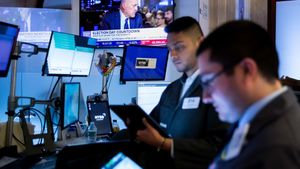New research highlights remarkable differences between US and UK retail investors, as attitudes and motivations reveal the distinct ways each side of the Atlantic engages with financial markets.
Recently, the trading and investment platform eToro partnered with Nasdaq to explore the behaviors and goals of retail investors from both nations. The findings were part of eToro's latest Retail Investor Beat survey, targeting 2,000 self-directed or advised investors—1,000 from the US and 1,000 from the UK.
The results unveiled significant contrasts, particularly when it came to financial objectives. A substantial 39% of American respondents expressed a desire for financial independence as their primary goal, compared to only 31% of UK investors who stated the same. On the flip side, UK investors were much more focused on retirement planning, with 42% prioritizing this aspect over 32% of American investors.
Investment discussions also differ dramatically between the two countries. American investors tend to be more open about their financial habits, with 41% discussing their portfolios with friends, compared to just 35% among UK investors. The gap widens even more when family conversations come up, where 37% of US investors chat about investments, but only 28% of their UK counterparts do the same. This shift toward openness reflects broader societal norms, as discussions about money remain somewhat taboo across the pond.
Educational pursuits also vary significantly. The study revealed 23% of US investors have taken formal investment courses, compared to just 15% of UK investors. Such proactive approaches are evident as American investors actively study the strategies of high-profile investors, with 36% doing so versus 28% among UK investors. Time spent on research activities reflects this trend as well, with Americans dedicat 2 hours and 42 minutes weekly to investment knowledge, compared to 2 hours and 24 minutes for UK investors.
These educational gaps extend to the types of resources each group trusts for financial news. UK investors place greater confidence in financial institutions, with 53% saying they trust them, and 44% relying on specialist media. Conversely, American investors are more likely to trust their social circles—friends, family, and colleagues— with 25% showing preference to these sources over 19% of UK investors.
While discussing these findings, Brandon Tepper, Senior Vice President and Global Head of Data at Nasdaq, noted the importance of transparency and data access for retail investors globally. He asserted, “Nasdaq partners with clients around the world to drive more transparency and access to data, which helps retail investors determine how to approach investment strategies based on what is most important to them.”
Further emphasizing the contrasts, eToro’s Managing Director for the UK, Dan Moczulski, observed the burgeoning retail investing culture. “The retail investing culture has evolved massively in the UK over the years, becoming more prevalent and discussed.” Yet, he recognized the remaining reluctance among UK investors to engage openly about their financial affairs when compared to their American peers.
These insights underline the necessity of enhancing educational resources and platforms for retail investors, particularly within the UK, to promote collective growth. With increasing reliance on technology and AI tools to aid investment strategies—17% of US respondents reported using AI for stock tracking, compared to 13% from the UK—the evolution of financial habits across both nations seems poised for significant shifts.
It’s not just about the numbers, but also the cultural nuances surrounding investing. The study suggests Americans are more inclined to normalize investment talks within their social circles, which could lead to smarter investment strategies and enhanced financial literacy over time. The hope is to encourage UK investors to embrace similar openness, possibly reshaping the financial conversation across the Atlantic.
With both markets rapidly adapting to the digitization of investment, there’s anticipation for how these attitudes will influence retail investing cultures moving forward. Consumers increasingly seek financial independence and are willing to engage, learn, and discuss these pathways openly. Whether this will spark larger conversations around investing, retirement, and wealth creation remains to be seen. But the winds of change are clearly blowing across the Atlantic with each new investment trend.



